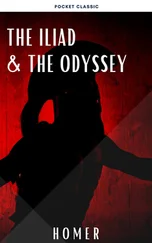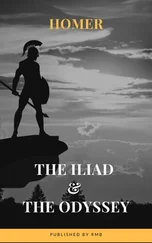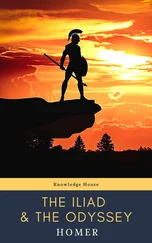John Milton - The Epic Poems Anthology - The Iliad, The Odyssey, The Aeneid, The Divine Comedy...
Здесь есть возможность читать онлайн «John Milton - The Epic Poems Anthology - The Iliad, The Odyssey, The Aeneid, The Divine Comedy...» — ознакомительный отрывок электронной книги совершенно бесплатно, а после прочтения отрывка купить полную версию. В некоторых случаях можно слушать аудио, скачать через торрент в формате fb2 и присутствует краткое содержание. Жанр: unrecognised, на английском языке. Описание произведения, (предисловие) а так же отзывы посетителей доступны на портале библиотеки ЛибКат.
- Название:The Epic Poems Anthology : The Iliad, The Odyssey, The Aeneid, The Divine Comedy...
- Автор:
- Жанр:
- Год:неизвестен
- ISBN:нет данных
- Рейтинг книги:4 / 5. Голосов: 1
-
Избранное:Добавить в избранное
- Отзывы:
-
Ваша оценка:
- 80
- 1
- 2
- 3
- 4
- 5
The Epic Poems Anthology : The Iliad, The Odyssey, The Aeneid, The Divine Comedy...: краткое содержание, описание и аннотация
Предлагаем к чтению аннотацию, описание, краткое содержание или предисловие (зависит от того, что написал сам автор книги «The Epic Poems Anthology : The Iliad, The Odyssey, The Aeneid, The Divine Comedy...»). Если вы не нашли необходимую информацию о книге — напишите в комментариях, мы постараемся отыскать её.
This collection includes:
–The Iliad and The Odyssey by Homer
–The Aeneid, by Virgil
–The Divine Comedy, by Dante Alighieri
–Venus and Adonis, by William Shakespeare
–Paradise Lost and Paradise Regained, by John Milton
The Epic Poems Anthology : The Iliad, The Odyssey, The Aeneid, The Divine Comedy... — читать онлайн ознакомительный отрывок
Ниже представлен текст книги, разбитый по страницам. Система сохранения места последней прочитанной страницы, позволяет с удобством читать онлайн бесплатно книгу «The Epic Poems Anthology : The Iliad, The Odyssey, The Aeneid, The Divine Comedy...», без необходимости каждый раз заново искать на чём Вы остановились. Поставьте закладку, и сможете в любой момент перейти на страницу, на которой закончили чтение.
Интервал:
Закладка:
With these words he sat down, and Agamemnon rose in anger. His heart was black with rage, and his eyes flashed fire as he scowled on Calchas and said, “Seer of evil, you never yet prophesied smooth things concerning me, but have ever loved to foretell that which was evil. You have brought me neither comfort nor performance; and now you come seeing among Danaans, and saying that Apollo has plagued us because I would not take a ransom for this girl, the daughter of Chryses. I have set my heart on keeping her in my own house, for I love her better even than my own wife Clytemnestra, whose peer she is alike in form and feature, in understanding and accomplishments. Still I will give her up if I must, for I would have the people live, not die; but you must find me a prize instead, or I alone among the Argives shall be without one. This is not well; for you behold, all of you, that my prize is to go elsewhither.”
And Achilles answered, “Most noble son of Atreus, covetous beyond all mankind, how shall the Achaeans find you another prize? We have no common store from which to take one. Those we took from the cities have been awarded; we cannot disallow the awards that have been made already. Give this girl, therefore, to the god, and if ever Jove grants us to sack the city of Troy we will requite you three and fourfold.”
Then Agamemnon said, “Achilles, valiant though you be, you shall not thus outwit me. You shall not overreach and you shall not persuade me. Are you to keep your own prize, while I sit tamely under my loss and give up the girl at your bidding? Let the Achaeans find me a prize in fair exchange to my liking, or I will come and take your own, or that of Ajax or of Ulysses; and he to whomsoever I may come shall rue my coming. But of this we will take thought hereafter; for the present, let us draw a ship into the sea, and find a crew for her expressly; let us put a hecatomb on board, and let us send Chryseis also; further, let some chief man among us be in command, either Ajax, or Idomeneus, or yourself, son of Peleus, mighty warrior that you are, that we may offer sacrifice and appease the the anger of the god.”
Achilles scowled at him and answered, “You are steeped in insolence and lust of gain. With what heart can any of the Achaeans do your bidding, either on foray or in open fighting? I came not warring here for any ill the Trojans had done me. I have no quarrel with them. They have not raided my cattle nor my horses, nor cut down my harvests on the rich plains of Phthia; for between me and them there is a great space, both mountain and sounding sea. We have followed you, Sir Insolence! for your pleasure, not ours—to gain satisfaction from the Trojans for your shameless self and for Menelaus. You forget this, and threaten to rob me of the prize for which I have toiled, and which the sons of the Achaeans have given me. Never when the Achaeans sack any rich city of the Trojans do I receive so good a prize as you do, though it is my hands that do the better part of the fighting. When the sharing comes, your share is far the largest, and I, forsooth, must go back to my ships, take what I can get and be thankful, when my labour of fighting is done. Now, therefore, I shall go back to Phthia; it will be much better for me to return home with my ships, for I will not stay here dishonoured to gather gold and substance for you.”
And Agamemnon answered, “Fly if you will, I shall make you no prayers to stay you. I have others here who will do me honour, and above all Jove, the lord of counsel. There is no king here so hateful to me as you are, for you are ever quarrelsome and ill affected. What though you be brave? Was it not heaven that made you so? Go home, then, with your ships and comrades to lord it over the Myrmidons. I care neither for you nor for your anger; and thus will I do: since Phoebus Apollo is taking Chryseis from me, I shall send her with my ship and my followers, but I shall come to your tent and take your own prize Briseis, that you may learn how much stronger I am than you are, and that another may fear to set himself up as equal or comparable with me.”
The son of Peleus was furious, and his heart within his shaggy breast was divided whether to draw his sword, push the others aside, and kill the son of Atreus, or to restrain himself and check his anger. While he was thus in two minds, and was drawing his mighty sword from its scabbard, Minerva came down from heaven (for Juno had sent her in the love she bore to them both), and seized the son of Peleus by his yellow hair, visible to him alone, for of the others no man could see her. Achilles turned in amaze, and by the fire that flashed from her eyes at once knew that she was Minerva. “Why are you here,” said he, “daughter of aegis-bearing Jove? To see the pride of Agamemnon, son of Atreus? Let me tell you—and it shall surely be—he shall pay for this insolence with his life.”
And Minerva said, “I come from heaven, if you will hear me, to bid you stay your anger. Juno has sent me, who cares for both of you alike. Cease, then, this brawling, and do not draw your sword; rail at him if you will, and your railing will not be vain, for I tell you—and it shall surely be—that you shall hereafter receive gifts three times as splendid by reason of this present insult. Hold, therefore, and obey.”
“Goddess,” answered Achilles, “however angry a man may be, he must do as you two command him. This will be best, for the gods ever hear the prayers of him who has obeyed them.”
He stayed his hand on the silver hilt of his sword, and thrust it back into the scabbard as Minerva bade him. Then she went back to Olympus among the other gods, and to the house of aegis-bearing Jove.
But the son of Peleus again began railing at the son of Atreus, for he was still in a rage. “Wine-bibber,” he cried, “with the face of a dog and the heart of a hind, you never dare to go out with the host in fight, nor yet with our chosen men in ambuscade. You shun this as you do death itself. You had rather go round and rob his prizes from any man who contradicts you. You devour your people, for you are king over a feeble folk; otherwise, son of Atreus, henceforward you would insult no man. Therefore I say, and swear it with a great oath—nay, by this my sceptre which shalt sprout neither leaf nor shoot, nor bud anew from the day on which it left its parent stem upon the mountains—for the axe stripped it of leaf and bark, and now the sons of the Achaeans bear it as judges and guardians of the decrees of heaven—so surely and solemnly do I swear that hereafter they shall look fondly for Achilles and shall not find him. In the day of your distress, when your men fall dying by the murderous hand of Hector, you shall not know how to help them, and shall rend your heart with rage for the hour when you offered insult to the bravest of the Achaeans.”
With this the son of Peleus dashed his gold-bestudded sceptre on the ground and took his seat, while the son of Atreus was beginning fiercely from his place upon the other side. Then uprose smooth-tongued Nestor, the facile speaker of the Pylians, and the words fell from his lips sweeter than honey. Two generations of men born and bred in Pylos had passed away under his rule, and he was now reigning over the third. With all sincerity and goodwill, therefore, he addressed them thus:—
“Of a truth,” he said, “a great sorrow has befallen the Achaean land. Surely Priam with his sons would rejoice, and the Trojans be glad at heart if they could hear this quarrel between you two, who are so excellent in fight and counsel. I am older than either of you; therefore be guided by me. Moreover I have been the familiar friend of men even greater than you are, and they did not disregard my counsels. Never again can I behold such men as Pirithous and Dryas shepherd of his people, or as Caeneus, Exadius, godlike Polyphemus, and Theseus son of Aegeus, peer of the immortals. These were the mightiest men ever born upon this earth: mightiest were they, and when they fought the fiercest tribes of mountain savages they utterly overthrew them. I came from distant Pylos, and went about among them, for they would have me come, and I fought as it was in me to do. Not a man now living could withstand them, but they heard my words, and were persuaded by them. So be it also with yourselves, for this is the more excellent way. Therefore, Agamemnon, though you be strong, take not this girl away, for the sons of the Achaeans have already given her to Achilles; and you, Achilles, strive not further with the king, for no man who by the grace of Jove wields a sceptre has like honour with Agamemnon. You are strong, and have a goddess for your mother; but Agamemnon is stronger than you, for he has more people under him. Son of Atreus, check your anger, I implore you; end this quarrel with Achilles, who in the day of battle is a tower of strength to the Achaeans.”
Читать дальшеИнтервал:
Закладка:
Похожие книги на «The Epic Poems Anthology : The Iliad, The Odyssey, The Aeneid, The Divine Comedy...»
Представляем Вашему вниманию похожие книги на «The Epic Poems Anthology : The Iliad, The Odyssey, The Aeneid, The Divine Comedy...» списком для выбора. Мы отобрали схожую по названию и смыслу литературу в надежде предоставить читателям больше вариантов отыскать новые, интересные, ещё непрочитанные произведения.
Обсуждение, отзывы о книге «The Epic Poems Anthology : The Iliad, The Odyssey, The Aeneid, The Divine Comedy...» и просто собственные мнения читателей. Оставьте ваши комментарии, напишите, что Вы думаете о произведении, его смысле или главных героях. Укажите что конкретно понравилось, а что нет, и почему Вы так считаете.












